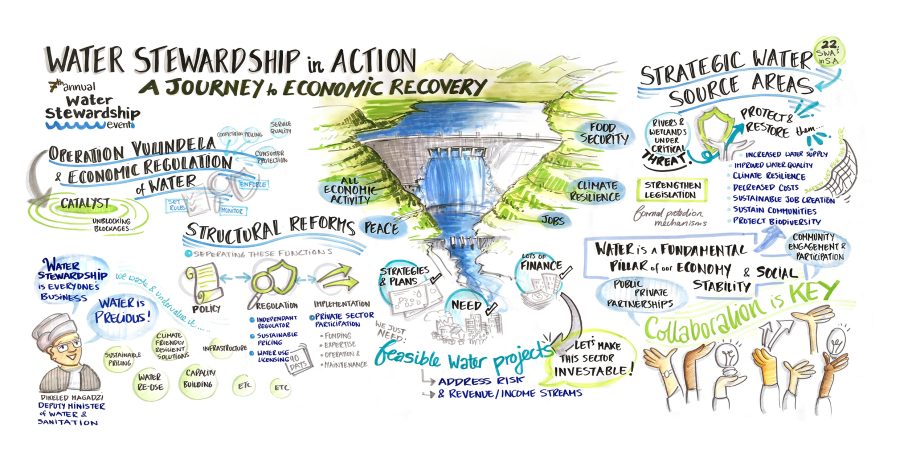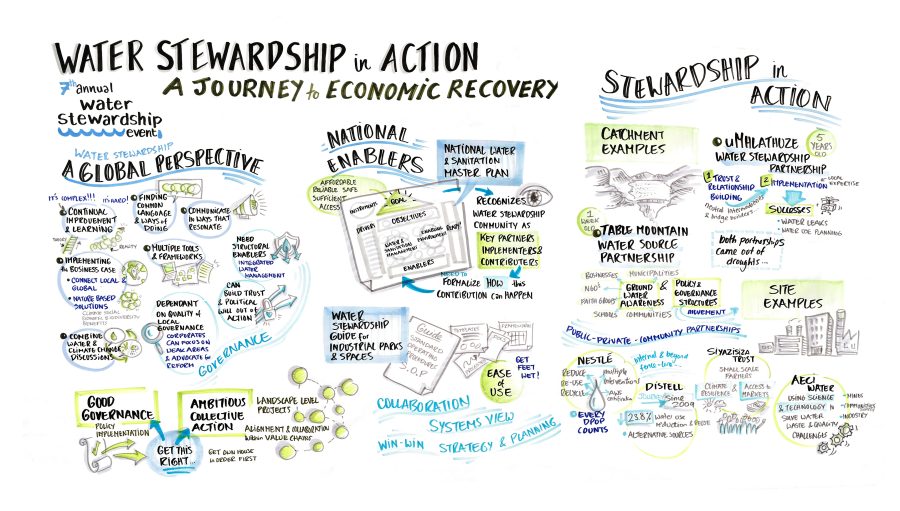Press release: Water Stewardship Event highlights the journey to economic recovery and a green economy post-Covid

25 November 2021 – The COVID-19 pandemic has affected the lives and livelihoods of millions in South Africa and around the world. The economic effects of the pandemic cannot be overstated. While South Africa’s economic growth is expected to rebound to 4% in 2021, this is on the back of a 7% contraction in 2020. This challenge presents an opportunity to build back better towards a green and sustainable future for all. The South African water sector offers huge potential for enabling economic recovery, combined with a quick turnaround, to ensure a greener economy post COVID-19.
How this recovery can be achieved was the focus of the 7th Annual Water Stewardship Conference, which took place in two morning sessions on 23 and 24 November 2021. The event brought together representatives from government, industry, civil society and development partners to explore how investments in South Africa’s water sector can be leveraged to generate sustained economic growth, employment and long-term wellbeing.
Jointly hosted by the National Business Initiative (NBI), the Strategic Water Partners Network (SWPN), the Royal Danish Embassy and supported by GIZ’s Natural Resources Stewardship Programme (NatuReS) and the Department of Water and Sanitation (DWS), the event builds on the momentum of last year’s consultations, which focused on Good Governance for Green Recovery: Stewardship in a Post-COVID Water Sector.
This year’s topic of “Water Stewardship in Action: A Journey to Economic Recovery”, unpacked what needs to be done to create robust governance for sustainable economic recovery and the national levers for anchoring water stewardship action to ensure initiatives and water investments support a post-COVID 19 green recovery.
The first day of the event sought to inspire further action and collaboration on the journey to economic recovery. The focus was on the economic regulation of water, ongoing structural reforms for enhanced management of the water sector and the economics of ecosystems. The second day highlighted the global discourse on stewardship and the numerous water stewardship initiatives taking place from local to national scale across the country. It also profiled the distinct work occurring at each level.

Why is a Green Economic Recovery Important?
The South African water sector struggles with financial challenges and capacity restrictions, constraining its ability to bridge the service delivery gap, a situation exacerbated by the impacts of the COVID-19 pandemic. These challenges are further aggravated by a lack of accountability linked to the governance, management, and oversight of the sector itself.
The National Water and Sanitation Master Plan indicates that only 65 percent of South Africans have access to safe and reliable water services, while 14.1 million people lack access to decent sanitation. Yet, the Master Plan also contains the solutions to address these issues, stating: “A turn-around towards financial sustainability is not optional.” The Master Plans also calls for enhanced revenue streams combined with cost reduction and explores different funding models and innovative technologies. Importantly, it also gives the private sector an opportunity to invest in water and wastewater projects.
With water as a key enabler of economic growth, there is an opportunity to leverage green and sustainable investments in the sector to support South Africa’s efforts to build back better. Further, partnerships between government, the private sector, academia as well as national and international financing institutions and facilities provides the institutional and financial strength to get it done.
Honourable Dikeledi Magadzi, Deputy Minister of the Department of Water and Sanitation (DWS), who spoke at the virtual event says: “COVID-19 has not only deeply affected the physical health of our country. It has exposed the big challenges we as a nation are still facing. Inequality, economic vulnerability, the lack of access to services and the lack of accountability. I would like to take this opportunity to appeal to the water sector to embrace the power of partnerships between private, public and civil society to collaboratively work together to close the water gap through taking a water stewardship approach.”

What does A Journey to Economic Recovery look like?
The COVID-19 pandemic has required collaborative action between Government, businesses and communities to identify critical blockages and ensure sustainable economic recovery that advances the green economy. A key aspect of the green economy is that it achieves water security. Opportunities for sustainable investing in South Africa’s infrastructure are abundant, including in the water, agriculture and energy sectors. Leveraging green finance may be the best way to tap into more resources from domestic and foreign institutional investors now that sustainable investment is a growing necessity.
Robust governance is a crucial enabler if green economic recovery is to be achieved in the South Africa’s water sector. Well governed institutions improve performance and bring about much-needed stability and recovery. In the public sector, the need for greater transparency in decision making, improved financial management and technical capacity at both national and municipal levels is needed. In the private sector, the focus on corporate accountability needs to remain high on the sustainability agenda with more stringent criteria required for corporate leadership on water security.
Through the promotion of community led good governance practice, communities can be equipped and informed on how to both engage with government and private sector stakeholders, as well as hold them to account for specific actions linked to water conservation and demand management. Examples of such action include participatory budgeting processes, greater transparency, deepening understanding of procurement systems and participation in project planning and design. This would ensure strategic links between economic development and natural resource protection and encourage greater ownership of initiatives.
